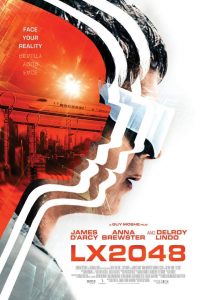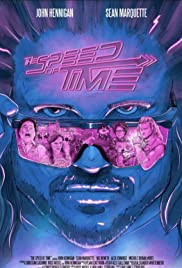You Gotta Kill the Person You Were Born to Be: Josh Pearce and Arley Sorg Discuss LX 2048 with Bonus Film The Speed of Time
 In this installment, Locus will be taking a look at two indie films that found their way into our inbox: full-length LX 2048 and short film The Speed of Time, both available on streaming services, and both offering up a slightly different selection than what we’re used to seeing in theatrical releases.
In this installment, Locus will be taking a look at two indie films that found their way into our inbox: full-length LX 2048 and short film The Speed of Time, both available on streaming services, and both offering up a slightly different selection than what we’re used to seeing in theatrical releases.
Josh: Let’s cover LX 2048 first. I think when I initially emailed you about it, I said something along the lines of, “I’m not sure this is necessarily a good movie, but there’s a shitload going on in it.”
Arley: This one was really weird for me. I kind of liked it in general, but the whole time I was constantly complaining about it in my head. However, there’s something about this movie that reminds me of Gattaca, I don’t know why. I love Gattaca, so that’s a good thing.
Josh: I had the same reaction — overanalyzing it the whole time so it was hard to sit back, relax, and enjoy it, but it was thought provoking.
To summarize: it is the future (2048 perhaps?). The sun is so toxic that humanity cannot survive outdoors during the day. The entire population is prescribed state-issued Lithium X and lives an almost entirely VR existence, while UV-resistant clones handle many tasks in the physical world. Adam Bird (James D’Arcy) is one of the rare humans who still goes out in the daytime. As an additional act of non-conformity, he refuses to take his medication.
Estranged from his wife and kids — who are absorbed with their devices — isolated from the rest of humanity, he commutes to work each morning through a depopulated world, arriving at an empty office where he holds VR teleconferences with distant partners. After he’s given the bad news that both his heart and his business are failing, Adam struggles to qualify for an insurance plan that will replace him, in death, with a new and improved clone to take care of his family.
The story is told non-linearly and it’s hard to keep track of things at first, but the movie does a good job of constantly reiterating the important points (Adam needs to save his company to keep his insurance to help his family after he dies), so the character’s motivation and goals are never really in doubt. All of these concepts are introduced even before Adam tracks down the inventor of human cloning, Donald Stein (Delroy Lindo), who, in a fit of philosophical digression, tells Adam that it may be possible for him to clone his virtual lover Maria (Gabrielle Cassi) and bring her into the physical world, adding yet another thematic complication.
Arley: It’s a problem of not knowing where to start the story. The movie felt unfocused, thematically, with all these different ideas thrown in. They should’ve focused in on one strong idea. Start it at the “insurance spouse” meeting.
Josh: The idea of an “insurance spouse” and being able to modify them is really interesting.
Arley: The ability to tweak a spouse the way you want, to be sitting there, watching your spouse putting that on paper — that’s something that couples now struggle with. The concept of acceptance. And you could see both characters, in that moment, looking at each other, wondering what changes the other would make, but both having that essential desire to be accepted as they are. I mean, that’s a three-hour movie right there, and it’s one I haven’t seen before. The transition from Act I to Act II made sense but everything after that was a mess.
Josh: Things really got interesting around the half-hour mark, I think.
Arley: Yup. I made a note. It’s at 34 minutes where the ideas really start to pick up.
Like Dave Eggers’s A Hologram for the King, this film focuses on a man, convinced he is dying, who clings to a dying industry in a changing, environmentally ruined world. Any film with this many science fictional ideas in it is guaranteed to be compared to a slew of other movies: the title of LX 2048 is reminiscent of THX 1138; virtual lovers and AI girlfriends can be found in Blade Runner 2049 and The Sixth Day, and cloning them brings it into Weird Science territory; Lithium X sounds and functions like the doses in Equilibrium; and once the story introduces chips that can store a person’s entire personality, you feel as though you’re watching a less-violent Altered Carbon.
Sometimes a mash-up of so many concepts transcends its references and becomes something new, like we noted in our review of Bloodshot. Apart from the unique idea of insurance spouses, though, LX 2048 feels like something we’ve seen before in countless iterations, like a season of Black Mirror.
Josh: You said it reminded you of Gattaca. We’re both getting certain vibes off it. I thought it was entirely Phildickian, which I know I’ve said about other films in our reviews before, but it’s pretty overt in LX 2048: you’ve got this average-joe protagonist making morally questionable decisions to save his business, and then it gets into weird Biblical references. His name is Adam, they create a new person from his parts, Stein is coming across as a god figure, and there’s a heavy messaging about love that all tracks with Philip K. Dick’s religious obsessions near the end of his life. And then there are multiple layers of questioning identity and reality.
Arley: There was this layer of humor that I recognized but it didn’t quite land for me. Like the droptop scene, with him in the full hazmat suit — I get that it was probably being played for comedic effect, but it reinforced for me the same problem as with Altered Carbon: high-concept science fiction that misses day-to-day details. That car and that suit would be severely outdated. He’s driving a Model-T, basically. There’s a scene where the sunlight comes in through the window and burns his arm, which I thought was really cool, I was like, yes! I want to see that skin crisp and the hair shrivel up. Problem is, even nowadays tons of buildings use different levels of tinting to conserve energy, especially if they are going for LEED certification. There are windows with glass that tints automatically, electrochromic glass, and so on. Ultimately, cool scene, makes no sense. For me, all the oversights (and there were a lot of them) are really distracting, especially when the movie itself draws attention to them by building a moment around them, but also when they add other little details on some things, like the laser-shaver.
Josh: I’m a little less concerned about every detail being perfectly futuristic in a movie like this where it’s idea-driven more than visuals-driven, because I try to keep budgetary constrictions in mind. I don’t super nitpick the nuts-and-bolts of Star Trek episodes if they’re presenting an interesting message. Similarly, the minutia of LX 2048 didn’t distract me from the actually engaging aspects of the film.
Even in these days of over-the-top special effects, wonderful things can be accomplished with smaller-budget films (see our reviews of Color Out of Space and The Invisible Man, for examples). The graphics in LX 2048 aren’t great, but the framing and set locations work well to give it a sufficiently futuristic feel, anyway. So much depends upon the performances. Most noticeably, the clones excel at delivering creepy atmosphere, just through subtle acting, with no fancy CGI, prosthetic, or makeup tricks needed to convince you that they fundamentally are not human.
Arley: I thought all of the acting was great.
Josh: I thought it was pretty rough at first, but then D’Arcy started acting against empty chairs, and then against himself, and my regard for him went up.
Arley: The Hamlet part was great. The way it was layered, the different tones of voice, Adam’s body language.
Josh: It’s a little cliché to do that soliloquy, but it was well performed.
Arley: You know that guy, Delroy Lindo —
Josh: Oh, yeah, I like him.
Arley: — I’ve met him! He lives near here, in Oakland, so sometimes I run into him at the post office.
Josh: What, no way! Next time you see him, you should tell him we enjoyed his work in this film.
Arley: I will. I’ll tell him, “You were a highlight of this movie.” He brought a lot of energy to it. More than the main guy, who is such an unlikeable character.
Josh: Yeah, this film tries really hard to make it sympathetic from his point of view — like he’s suppose to be the only person in the whole world who cares about “real life” — but I found it really easy to see it from his wife Reena’s (Anna Brewster) point of view how he’s just a horrible partner. I find it hard to believe that Adam is the only person not taking his meds.
Arley: There are some gender problems with this film.
Josh: The main one I noticed was when Maria shows up and starts talking about how she slept with the guy who cloned her. “He’s my liberator, why wouldn’t I want to thank him?” And I said, “With sex?! That’s fucked up.”
Arley: Shows a lack of understanding of gender issues and it’s toxic. Especially if you look at the way the wife is portrayed – she doesn’t give a shit when he’s dying, blah blah blah, typical one-sided male gaze BS — and then this manic pixie dream girl who’s moaning in the shower.
Josh: That scene of seeing one naked woman instead of another is straight out of A Scanner Darkly (and again, kind of out of Blade Runner 2049).
Arley: It’s like the writer was trying to say something meaningful about gender relations, but hadn’t read the full text of the issue at hand, had only skimmed CliffsNotes, and just completely failed overall. You don’t really need to cram all these ideas in and then drop them. Pick one strong idea and explore it, and cut out all the other “deep” thoughts. Also, race problems: very white.
Josh: Well, it was made in Lithuania. If you’re running on a tiny budget, I don’t think you’re going to find a lot of Black actors in the local acting pool there.
Arley: Doesn’t matter. If they could get Delroy Lindo all the way from California, they could bring in at least one other person of color. If nothing else, the rest of Europe is right there.
So, with a bit of a throwback feel and some heavy philosophical ideas, LX 2048 will likely appeal to a cult following of viewers who appreciate a movie’s conceptual premise even if the plot itself is a mess, like Donnie Darko, the Cube trilogy, The Fountain —
Arley: Tron.
Josh: Repo: The Genetic Opera. Man that movie is so bad, but I really liked it.
Arley: I found LX 2048… interesting. I’m going to recommend it to people who like films built around science fiction ideas, where the rest of it isn’t that important. Because it really is interesting. And let’s face it, a lot of classic SF literature is a lot like this. But if you’re into tightly knit narrative or good characters, this might not be for you.
Josh: This is definitely a high concept story. I enjoyed it as a better PKD adaptation (even though it’s not based on any of Dick’s actual writings), certainly better than some of his other adapted stories like Paycheck, Adjustment Bureau, or Next. And now, on to something a little less cerebral.
Written and directed by: Guy Moshe
Starring: Juliet Aubrey, Anna Brewster, Gabrielle Cassi, James D’Arcy, Logan Findlay, Linc Hand, Jay Hayden, Delroy Lindo, Gina McKee, Ronin Zaki Moshe & Majus Motiejus Prokopas.
 The Speed of Time is a 12-minute film, premiering on Dust, about future time cop Johnny Killfire (pro wrestler John Hennigan), who goes back in time and teams up with his younger self (Sean Marquette) to stop TimeBorgs from getting their hands on pizza app technology with the potential to destroy the space-time continuum. John’s friend Orville (pro wrestler Nic Nemeth) complicates things.
The Speed of Time is a 12-minute film, premiering on Dust, about future time cop Johnny Killfire (pro wrestler John Hennigan), who goes back in time and teams up with his younger self (Sean Marquette) to stop TimeBorgs from getting their hands on pizza app technology with the potential to destroy the space-time continuum. John’s friend Orville (pro wrestler Nic Nemeth) complicates things.
Josh: I laughed a lot at some of these lines: “He died of cancer… tomorrow!” “I killed myself so I never existed. The perfect crime.” I rarely expect much acting ability out of wrestlers, with a few exceptions (Dwayne Johnson and Dave Bautista) but John Hennigan was a good choice in this, especially for stuntwork.
Arley: I thought it was really funny. Well put together, well done. Low budget you can tell but I don’t care. Right amount of camp, right amount of meta, works really well. It was talking to the audience. It takes itself seriously and doesn’t take itself seriously to just the right degree.
Josh: Even though it’s low budget, I thought it looked good. It’s goofy and smart — it shortcuts all the stuff you expect in a timeloop movie, trusting that the audience has already seen that setup before, and goes right into playing around with the concept. I love that Johnny Killfire kept trying to pull off witty one-liners and his younger self just says, “That doesn’t make any sense.”
Arley: I loved that too! It’s really entertaining, and it’s short. Again, I did not like that it was really white. The one Black character was a cop, in a stereotypical role, and suffered a unique, physically violent fate at the hands of a white person, which motivated me to tweet that white people should use more POC characters, but that they should be thoughtful about the way they use POC characters, because there’s a whole historic context of violence – especially of white people committing violence against Black people. It irritated me, it hurt my feelings, but the movie’s fun, I still enjoyed it. If these guys make another movie I will watch it.
Josh: I recommend this one. It was the right length. A full-length movie like this would be beating a gimmick to death.
Arley: Honestly, with humor, I feel like that is so often the fatal flaw: people beat the gag to death. This was great.
Josh: They got in, said what they had to say, and got right back out.
Directed by: William J. Stribling
Written by: Russ Nickel & William J. Stribling
Starring: John Hennigan, Sean Marquette, Nic Nemeth & Alex Jennings

ARLEY SORG, Associate Editor, grew up in England, Hawaii, and Colorado. He studied Asian Religions at Pitzer College. He lives in Oakland, and usually writes in local coffee shops. A 2014 Odyssey Writing Workshop graduate, he is soldering together a novel, has thrown a few short stories into orbit, and hopes to launch more.
JOSH PEARCE, Assistant Editor, started working at Locus in 2016. He studied creative writing at SFSU and has sold short stories and poems to a variety of speculative fiction magazines. Born and raised in the Bay Area, he currently lives in the East Bay with his wife and sons and spends way too much time on Twitter: @fictionaljosh. One time, Ken Jennings signed his chest.
 While you are here, please take a moment to support Locus with a one-time or recurring donation. We rely on reader donations to keep the magazine and site going, and would like to keep the site paywall free, but WE NEED YOUR FINANCIAL SUPPORT to continue quality coverage of the science fiction and fantasy field.
While you are here, please take a moment to support Locus with a one-time or recurring donation. We rely on reader donations to keep the magazine and site going, and would like to keep the site paywall free, but WE NEED YOUR FINANCIAL SUPPORT to continue quality coverage of the science fiction and fantasy field.
©Locus Magazine. Copyrighted material may not be republished without permission of LSFF.







